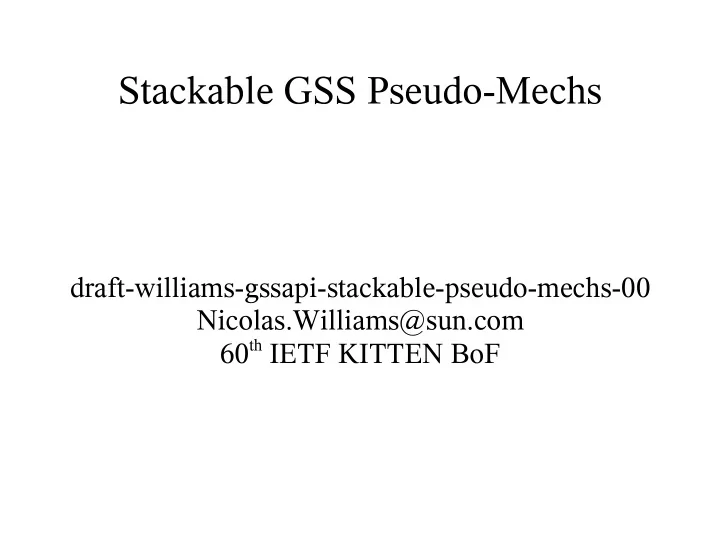

Stackable GSS Pseudo-Mechs draft-williams-gssapi-stackable-pseudo-mechs-00 Nicolas.Williams@sun.com 60 th IETF KITTEN BoF
History ● 2000: LIPKEY [RFC2847], basic-over-SPKM ● Early-2003: CCM-BIND (I-D), first stackable GSS-API pseudo-mechanism ● 58 th IETF: hallway discussion of mechanism stacking resulted in: – Need for abstraction – Ideas for other stackable pseudo-mechs – Need to think about negotiation, complexity ● 60 th IETF: 1 st I-D on stackable pseudo-mechs
Glossary ● Concrete mechanism ● Stackable pseudo-mech – A GSS-API mechanism – A mechanism that is to that can be used as is be “stacked above” or combined with a ● Pseudo-mechanism composite or concrete – A GSS-API mechanism mechanism that cannot be used ● Composite mechanism without reference to a – A combination of a concrete mechanism; e.g., SPNEGO stackable and a composite or concrete mech
Introduction ● The GSS-API is a generic interface to security mechanisms – Mechanisms are addressed by their OIDs – Mechs define: context tokens, per-msg context tokens, and sundry GSS details, such as name forms ● GSS mechanisms exist for: Kerberos V, PKIX (SPKM), and others, such as Microsoft's NTLMSSP, Sun's mech_dh ● GSS pseudo-mechanisms exist for: negotiating mechanisms (SPNEGO)
Introduction (cont.) ● In the process of developing a new lightweight GSS-API pseudo-mechanism for NFS we expanded on the GSS-API notion of channel bindings and the new mechanism (CCM-BIND) came to be about channel bindings ● At the same time we developed the notion of GSS mechanism stacking so we could leverage existing GSS mechanisms in the construction of new ones – CCM-BIND being one example
Introduction (cont.) ● Composite mechanisms have OIDs, just like any other mechanism – Composite mech OIDs are made by prefixing the OID of the stackable mechanism to that of the mechanism stacked below it ● Stackable mechs can be stacked over other composite mechs, making a stack ● Composite mechs are used just like concrete mechs
LIPKEY: Almost a Stack ● LIPKEY is a GSS mechanism that does the SPKM equivalent of basic-over-SSL – LIPKEY first uses SPKM-3 to establish a security context that authenticates the acceptor (using its cert) but not the initiator – then it sends the initiator's name and password confidentiality protected with the SPKM-3 context ● But LIPKEY is not an example of a stackable pseudo-mech, though it could have been – No OID prefixing; LIPKEY only works over SPKM
Ideas for Stackable Pseudo-Mechs ● Proper channel binding and negotiation – CCM-BIND ● PFS ● Compression ● Basic-over-* ● Three-party authentication ● etc...
Example: PFS ● Let's call this the PFSMECH ● PFSMECH context tokens might contain: – Context tokens for mech stacked below – DH public parameters ● PFSMECH would have its own per-msg tokens – Perhaps based on existing design, such as krb5's ● One PFSMECH OID prefix per-{group, ciphers}? Or other scheme? – This would eschew GSS-API lameness w.r.t. QoPs
Problems ● Not all mechanism stacks will make sense – {pfs, compress, krb5} is no good, but {compress, pfs, krb5} is Ok ● Complexity – Many valid composites – How to negotiate mechanisms? ● GSS_Indicate_mechs() and friends
Problems (cont.) ● Security analysis of composite mechanisms – What combinations make sense, which don't? – What are the attributes of a composite mechanism?
Solutions ● GSS_Indicate_mechs() and friends MUST NOT indicate stackable mechs ● GSS_Indicate_mechs() and friends MUST NOT indicate composite mechs unless explicitly configured to do so (and even then...) ● Add new APIs for indicating stackable/ composite mechs
Solutions (cont.) ● Users of composite mechs know what features they want from them, but why should they know the OIDs of the composite mechs they need? – Add APIs for inquiring mechs for/by their attributes ● These new APIs are all OPTIONAL – Without them apps have to hardcode composite mech OIDs – no big deal ● Mechanism attributes have OIDs and symbolic names (GSS_C_MA_*)
Solutions (cont.) ● Stackable pseudo-mechanism specifications should describe – Constraints on mechanisms, by attributes, that can be stacked below – How to compute the attributes of mechanisms composed with them in terms of the attributes of the mechanisms stacked below
Benefits of the New APIs ● No need to hardcode mechanism OIDs anymore – e.g., SSHv2 implementations MUST NOT use SPNEGO, but SPNEGO might get new OIDs[*] ● Let SSHv2 implementations query for/by mechanism attributes and ignore any mechs that negotiate mechs ● Mechanism attributes give us a way to formalize the descriptions of mechanisms – Hardcoding attrs' symbolic names is better than hardcoding mechanism OIDs; see above
Benefits of the New APIs (cont.) ● Indicating mechs by attributes makes GSS-API applications more general – Unless the new mech-specific GSS-API extensions
New APIs ● GSS_Indicate_mechs_by_attrs() ● GSS_Inquire_mechs_for_attrs() ● GSS_Display_mech_attr() ● [utility] GSS_Compose_OID() ● [utility] GSS_Decompose_OID() ● GSS_Indicate_negotiable_mechs() ● GSS_Negotiate_mechs()
Mechanism Attributes ● Concrete, stackable, composite, glue[*], other ● Deprecated (e.g., old krb5 mech OID), non- standard (e.g., GSI's SSL mech) ● Authenticates initiator, acceptor, both, neither ● Supports credential delegation ● Supports confidentiality and/or integrity protection, replay, out-of-sequence detection ● PFS, channel bindings, compression ● Etc...
Mechanism Attributes (cont.) ● GSS_C_MA_* ● Mech attrs are identified by symbolic names and OIDs – So that SET OF mechanism attributes is SET OF OBJECT IDENTIFIER – Which leverages existing C-Bindings for OID sets ● Keeps the API simple, stupid
Internet-Drafts ● draft-ietf-nfsv4-ccm-02.txt ● draft-williams-gssapi-stackable-pseudo-mechs- 00.txt
Q/A ● Questions? ● Please review
Recommend
More recommend